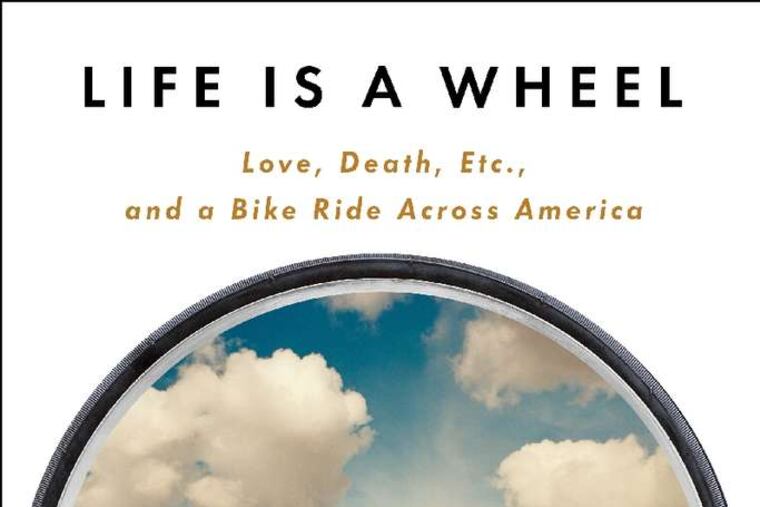Across America on two-wheels
Bruce Weber claims that traveling by bicycle isn't "the contemplative, mind-meandering activity that it is generally presumed to be." And the New York Times writer, whose Life Is a Wheel chronicles his 79-day, 4,122-mile pedal from Astoria, Ore., back to his apartment in Lower Manhattan, has a point.

Life Is a Wheel
Love, Death, Etc., and a Bike Ride Across America
By Bruce Weber
Scribners. 352 pp. $26
nolead ends nolead begins
Reviewed by Steven Rea
Bruce Weber claims that traveling by bicycle isn't "the contemplative, mind-meandering activity that it is generally presumed to be."
And the New York Times writer, whose Life Is a Wheel chronicles his 79-day, 4,122-mile pedal from Astoria, Ore., back to his apartment in Lower Manhattan, has a point: riding 50, 60, 70 miles a day, sometimes on busy blacktops with tractor trailers rocketing alongside, on county roads that suddenly dissolve to gravel, through endless prairies wondering if you're going to a find a place to eat, or sleep, the concerns are more immediate, practical, particular.
But when Weber pulls into a motel for the night, wrings out his sweat-soaked cycling duds and pulls out his iPad, the bigger ruminations start coming.
Life Is a Wheel, as its title suggests (a title that's the penultimate line for a shambling existential joke Weber happily shares along the way), fuses first-person accounts of granny-gearing the Rockies with larger musings about life, death, love, friendship, family, and the country he's heading across: a vast, strange, serene, contradictory and ridiculously scenic America.
Weber, who writes obituaries for the Times, took his custom-built, $8,000 touring bike across America in the summer and early fall of 2011, and blogged about it on the paper's Travel site (and in its pages). He got some flak for that hefty price tag, and he got his share of (excuse the pun) crank comments, too, most notably a dyspeptic nemesis Weber dubs Mr. Scorpion, who sent him scolding missives about the follies of his endeavor.
This was Weber's second transcontinental cycling jaunt - he had traversed the States in 1993, when he hadn't yet hit 40. Now he's 57, fit but not without health issues: acid reflux, an occasional episode of gout, nearsightedness, tinnitus in the ear, spinal stenosis in the neck. And a tendency to fall melancholy.
"The standard joke," he writes, "is that I'm both perfectly healthy and falling apart . . . ."
What better time to hit the road, Jack, stare death and decrepitude in the face, test one's mettle, see how you've changed, how the country has changed? One seismic shift is technological: there was no blogging, tweeting, Facebooking, or GPS tracking the first time Weber rode solo across the States. This time, fellow cyclists offer route advice, join him for ride-alongs. Old friends meet up, new friends offer a bed for the night, or deliver a homemade pie. Followers of his blog post words of encouragement, recommendations, routes to take, bike shops, bars.
This is one of the most heartening things about Life Is a Wheel: Although Weber had some beer cans, and some belligerence, thrown at him, for the most part the folks he ran into offered only good wishes, good company and the occasional back-of-the-pickup conveyance when he was faced with a dead end, a dangerous directional dilemma. The kindness of strangers, even in a country fiercely divided into red states and blue, is much in evidence.
Life Is a Wheel isn't just journal entries about fields of North Dakota sunflowers, about grinding through baking heat, pouring rain, gusting winds, about the shabby inns and Indian-reservation casino hotels, hitting the summit of Logan Pass, the Continental Divide. Weber loses a best friend to cancer in the early weeks of his ride, parks his bike and takes a plane to L.A. for the memorial service, where he delivers a eulogy.
Weber takes his writing, and his friendships, seriously, and he reprints his final words about Billy Joseph. They are crushingly beautiful. He also shares the eulogy he wrote for his mother, Eileen, who battled with MS (she was sick for so long that he only remembers her that way) and whose increasing frailties placed impossible burdens on his father, too.
Life Is a Wheel, then, is a memoir, full of reflections about growing up in suburban New Jersey (which, it should be noted, Weber deems "the nation's least bike-friendly state"), about romance, relationships, regrets. There are chapters about another cycling trip Weber took, too: the Ho Chi Minh Trail in Vietnam, in 1994 - a surreal, scary, comic adventure that could make a great movie.
And there is Jan Benzel, a fellow journalist who became the commitment-phobic Weber's girlfriend (on a bike trip through Provence) and who accompanies the author on the Great Allegheny Passage - three days of car-less bliss and dramatic gorges on a reclaimed railway from Pittsburgh to Cumberland, Md. She rides a folding British bike, and Weber unfolds his deepest feelings as he waxes on about this spirited woman.
Life Is a Wheel has an epilogue that I won't get into, other than to say it makes you think twice about Weber's trip across the heartland and the fateful things that might have happened out there in the middle of nowhere. But this poignant postscript brings the book full circle, in more ways than one.
Life Is a Wheel is a book for cyclists, certainly, and for anyone who has ever dreamed of such transcontinental travels. But it also should prove enlightening, soul-stirring, even, to those who don't care a whit about bikes but who care about the way people connect - strangers, friends, parents and children, lovers.
215-854-5629
@Steven_Rea